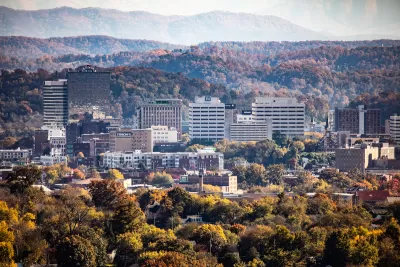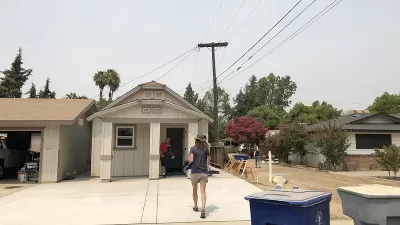With the cost of housing around Knoxville, Tennessee rising, elected officials and political candidates are looking for new ways to allow residential density.

Knoxville Mayor Mayor Indya Kincannon is expected to proposed zoning changes that would make it easier to build missing middle housing.
Silas Sloan reports that the mayor is focusing on residential density as the cost of housing around the Eastern Tennessee continues to rise.
“Kincannon told Knox News the proposed changes are based on a fall 2022 housing landscape study conducted by Opticos Design, a zoning reform consultancy hired by the city and Knoxville-Knox County Planning to identify solutions to the housing crunch,” writes Sloan.
Opticos Senior Associate Tony Perez is quoted in the article saying that vague and outdated language in Knoxville’s zoning code makes it difficult to develop missing middle housing.
“The proposed changes, created in partnership with East Tennessee Realtors, should be presented to the Knoxville City Council and Knoxville-Knox County Planning Commission this fall, Kincannon said, with a goal of finalizing the changes by January 2024,” reports Sloan.
Sloan also adds that R. Bentley Marlow, a developer who is running for the city's council's at-large seat B, has proposed another set of zoning changes that would allow missing middle housing a permitted development, or by-right development, in residential neighborhoods, rather than a special use.
Zoning reforms have been developing in Tennessee for a few years now as the state deals with swift growth and surging housing costs. Nashville reformed its parking requirements, setting parking maximums, in November 2022, for an example of a city achieving legislative reform prior to Knoxville’s explorations of missing middle housing.
FULL STORY: Knoxville's housing crisis could get help by easing path to build duplexes and townhomes [paywall]

Maui's Vacation Rental Debate Turns Ugly
Verbal attacks, misinformation campaigns and fistfights plague a high-stakes debate to convert thousands of vacation rentals into long-term housing.

Planetizen Federal Action Tracker
A weekly monitor of how Trump’s orders and actions are impacting planners and planning in America.

In Urban Planning, AI Prompting Could be the New Design Thinking
Creativity has long been key to great urban design. What if we see AI as our new creative partner?

King County Supportive Housing Program Offers Hope for Unhoused Residents
The county is taking a ‘Housing First’ approach that prioritizes getting people into housing, then offering wraparound supportive services.

Researchers Use AI to Get Clearer Picture of US Housing
Analysts are using artificial intelligence to supercharge their research by allowing them to comb through data faster. Though these AI tools can be error prone, they save time and housing researchers are optimistic about the future.

Making Shared Micromobility More Inclusive
Cities and shared mobility system operators can do more to include people with disabilities in planning and operations, per a new report.
Urban Design for Planners 1: Software Tools
This six-course series explores essential urban design concepts using open source software and equips planners with the tools they need to participate fully in the urban design process.
Planning for Universal Design
Learn the tools for implementing Universal Design in planning regulations.
planning NEXT
Appalachian Highlands Housing Partners
Mpact (founded as Rail~Volution)
City of Camden Redevelopment Agency
City of Astoria
City of Portland
City of Laramie





























